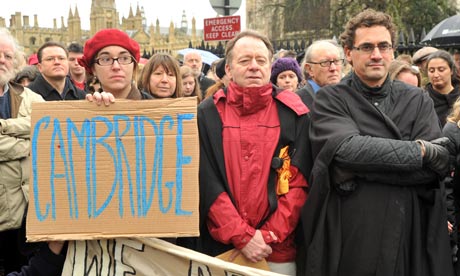Jessica Shepherd
Academics gather in opposition to government changes planned for higher education.

Hundreds of Cambridge University dons will today hold a silent protest against what they say are the government's "devastating" changes to higher education.
The academics will assemble opposite the university's Senate House at midday for three minutes' silence. They will be dressed in traditional academic attire of black gowns and hoods.
Organisers of the protest said they wanted to show "discontent" with the government's plans to introduce higher tuition fees, cut state funding of higher education by tens of millions of pounds, and promote the "marketisation" of universities.
They said they were also unhappy that their university had "maintained a silence" over the government's proposed changes to higher education.
From autumn 2012, universities will be allowed to charge tuition fees of up to £9,000 a year. Currently, the maximum is £3,290 a year. The fees will be repaid by graduates who are earning at least £21,000.
It was reported over the weekend that universities' budgets would be cut by nearly £400m a year before they can begin to charge higher fees. Last October's spending review cut the higher education budget from £7.1bn to £4.2bn by 2014. Funding for arts and humanities is likely to be hardest hit, with government support maintained for science, technology, engineering and maths degrees.
Today's protest comes ahead of a discussion tomorrow in Regent House – the dons' parliament in Cambridge – over whether the university has taken a strong enough stance against higher fees and national changes to higher education.
There are more than 4,000 members of Regent House and they make up half the university's staff, including academics, heads of colleges, librarians, curators and administrators. The discussion is listed to be about "the university's response to proposed changes in higher education funding in light of the more detailed proposals following the Browne review". That review, commissioned by the previous Labour government, recommended a radical shake-up of higher education, including higher fees.
Today's protest has been organised by the Cambridge Academic Campaign for Higher Education (Cache), which has 300 supporters and supported students' occupation of a room in the university's main administrative building last month as part of a campaign against the rise in tuition fees.
Ruth Watson, a lecturer in African history, said the university's "strategy was to maintain a silence in the hope that the problem of higher education funding went away".
A spokesman for Cambridge said: "The university is awaiting details of the government's proposals before we can make a detailed response. Of course the university respects academics' right to peaceful protest."
He said it was "simply not true that the university has been silent on the issue of funding cuts and fees," pointing to a new year's message from the vice-chancellor, Professor Sir Leszek Borysiewicz, in which he told academics: "There is little doubt that we stand to lose much of the present direct government teaching grant."
Ian Patterson, a fellow in English at Queens' College, said he would protest today because an increase in fees would "deter some students from coming to university" and would be accompanied by a "huge reduction in government funding, particularly for research and teaching and the arts, humanities and social sciences".
He added: "This shortsighted policy appears to have no understanding of the importance of these areas of cultural life, seeing higher education only as a route to personal prosperity and national economic productivity. "We insist that the university is not, in its core functions, a business, but a place of free intellectual activity and the pursuit of knowledge without regard to its economic ends.
"We are dismayed and angry at this threat to educational principles central to the work of the university, and we are determined to persuade the government to change its mind."
Charles Jones, a reader in international relations at the university, said it was important to "bear public witness to the damage being inflicted on the country by wrong-headed policies".
• The picture on this story has been changed for two reasons: the protest has now taken place – and poetdontknowit asked so nicely



















Sem comentários:
Enviar um comentário